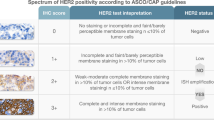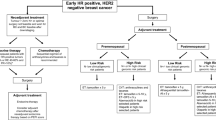Abstract
Purpose
In this study, we aimed to determine the incidence of receptor conversions after neoadjuvant chemotherapy (NAC) for breast cancer and assess the rate at which receptor conversion leads to changes in adjuvant therapy regimens.
Methods
We performed a retrospective review of female breast cancer patients treated with NAC at an academic breast center between January 2017 and October 2021. Patients with residual disease on surgical pathology and complete receptor status information for both pre-NAC and post-NAC specimens were included. Incidence of receptor conversions, defined as a change in at least one hormone receptor (HR) or HER2 status compared to preoperative specimens, was tabulated, and adjuvant therapy modalities were reviewed. Factors associated with receptor conversion were analyzed using chi-square tests and a binary logistic regression.
Results
Of the 240 patients with residual disease after NAC, 126 (52.5%) had receptor testing repeated. After NAC, 37 specimens (29%) had a receptor conversion. Receptor conversion resulted in the addition or removal of an adjuvant therapy in 8 patients (6%), indicating a number needed to screen of 16. Prior history of cancer, receipt of initial biopsy at an outside site, HR-positive tumors, and a pathologic stage of II or lower were factors associated with receptor conversions.
Conclusion
HR and HER2 expression profiles frequently change after NAC and drive adjustments in adjuvant therapy regimens. Repeat testing of HR and HER2 expression should be considered in patients who receive NAC, especially in patients with early stage, HR-positive tumors whose initial biopsies were performed externally.
Similar content being viewed by others
Data availability
The datasets generated during and/or analyzed during the current study are not publicly available due to the presence of patient identifiers within the dataset but will be made available in a deidentified format from the corresponding author on reasonable request.
References
Mauri D, Pavlidis N, Ioannidis JP (2005) Neoadjuvant versus adjuvant systemic treatment in breast cancer: a meta-analysis. J Natl Cancer Inst 97(3):188–194. https://doi.org/10.1093/jnci/dji021
Caudle AS, Yang WT, Krishnamurthy S et al (2016) Improved axillary evaluation following neoadjuvant therapy for patients with node-positive breast cancer using selective evaluation of clipped nodes: implementation of targeted axillary dissection. J Clin Oncol 34(10):1072–1078. https://doi.org/10.1200/JCO.2015.64.0094
Duffy MJ, Harbeck N, Nap M et al (2017) Clinical use of biomarkers in breast cancer: updated guidelines from the European group on tumor markers (EGTM). Eur J Cancer 75:284–298. https://doi.org/10.1016/j.ejca.2017.01.017
Trialist C, Group C (2005) Effects of chemotherapy and hormonal therapy for early breast cancer on recurrence and 15-year survival: an overview of the randomised trials. The Lancet 365(9472):1687–1717. https://doi.org/10.1016/S0140-6736(05)66544-0
Jin X, Jiang YZ, Chen S, Yu KD, Shao ZM, Di GH (2015) Prognostic value of receptor conversion after neoadjuvant chemotherapy in breast cancer patients: a prospective observational study. Oncotarget 6(11):9600–9611. https://doi.org/10.18632/oncotarget.3292
Kinsella MD, Nassar A, Siddiqui MT, Cohen C (2012) Estrogen receptor (ER), progesterone receptor (PR), and HER2 expression pre- and post- neoadjuvant chemotherapy in primary breast carcinoma: a single institutional experience. Int J Clin Exp Pathol 5(6):530–536
Rey-Vargas L, Mejia-Henao JC, Sanabria-Salas MC, Serrano-Gomez SJ (2020) Effect of neoadjuvant therapy on breast cancer biomarker profile. BMC Cancer 20(1):675. https://doi.org/10.1186/s12885-020-07179-4
Kasami M, Uematsu T, Honda M et al (2008) Comparison of estrogen receptor, progesterone receptor and Her-2 status in breast cancer pre- and post-neoadjuvant chemotherapy. Breast 17(5):523–527. https://doi.org/10.1016/j.breast.2008.04.002
Arens N, Bleyl U, Hildenbrand R (2005) HER2/neu, p53, Ki67, and hormone receptors do not change during neoadjuvant chemotherapy in breast cancer. Virchows Arch 446(5):489–496. https://doi.org/10.1007/s00428-005-1244-0
van de Ven S, Smit VT, Dekker TJ, Nortier JW, Kroep JR (2011) Discordances in ER, PR and HER2 receptors after neoadjuvant chemotherapy in breast cancer. Cancer Treat Rev 37(6):422–430. https://doi.org/10.1016/j.ctrv.2010.11.006
Xian Z, Quinones AK, Tozbikian G, Zynger DL (2017) Breast cancer biomarkers before and after neoadjuvant chemotherapy: does repeat testing impact therapeutic management? Hum Pathol 62:215–221. https://doi.org/10.1016/j.humpath.2016.12.019
De La Cruz LM, Harhay MO, Zhang P, Ugras S (2018) Impact of neoadjuvant chemotherapy on breast cancer subtype: does subtype change and if so, how? : IHC profile and neoadjuvant chemotherapy. Ann Surg Oncol 25(12):3535–3540. https://doi.org/10.1245/s10434-018-6608-1
Dede DS, Gumuskaya B, Guler G, Onat D, Altundag K, Ozisik Y (2013) Evaluation of changes in biologic markers ER, PR, HER 2 and Ki-67 index in breast cancer with administration of neoadjuvant dose dense doxorubicin, cyclophosphamide followed by paclitaxel chemotherapy. J BUON Apr-Jun 18(2):366–371
Wu YT, Li X, Lu LJ et al (2017) Effect of neoadjuvant chemotherapy on the expression of hormone receptors and Ki-67 in Chinese breast cancer patients: A retrospective study of 525 patients. J Biomed Res. https://doi.org/10.7555/JBR.32.20170059
Branco FP, Machado D, Silva FF et al (2019) Loss of HER2 and disease prognosis after neoadjuvant treatment of HER2+ breast cancer. Am J Transl Res 11(9):6110–6116
Ferraro E, Razavi P, Chandarlapaty S et al (2021) Change in HER2 status after neoadjuvant chemotherapy (NAC) with trastuzumab and pertuzumab (HP) in patients with HER2-positive early-stage breast cancer. J Clin Oncol 39(15_suppl):e12614–e12614. https://doi.org/10.1200/JCO.2021.39.15_suppl.e12614
Tacca O, Penault-Llorca F, Abrial C et al (2007) Changes in and prognostic value of hormone receptor status in a series of operable breast cancer patients treated with neoadjuvant chemotherapy. Oncologist 12(6):636–643. https://doi.org/10.1634/theoncologist.12-6-636
Li C, Fan H, Xiang Q et al (2019) Prognostic value of receptor status conversion following neoadjuvant chemotherapy in breast cancer patients: a systematic review and meta-analysis. Breast Cancer Res Treat 178(3):497–504. https://doi.org/10.1007/s10549-019-05421-7
Hammond ME, Hayes DF, Dowsett M et al (2010) American Society of Clinical Oncology/College of American Pathologists guideline recommendations for immunohistochemical testing of estrogen and progesterone receptors in breast cancer. Arch Pathol Lab Med 134(6):907–922. https://doi.org/10.1043/1543-2165-134.6.907
Allison KH, Hammond MEH, Dowsett M et al (2020) estrogen and progesterone receptor testing in breast cancer: American Society of Clinical Oncology/College of American Pathologists Guideline Update. Arch Pathol Lab Med 144(5):545–563. https://doi.org/10.5858/arpa.2019-0904-SA
Wolff AC, Hammond ME, Hicks DG et al (2014) Recommendations for human epidermal growth factor receptor 2 testing in breast cancer: American Society of Clinical Oncology/College of American Pathologists clinical practice guideline update. Arch Pathol Lab Med 138(2):241–256. https://doi.org/10.5858/arpa.2013-0953-SA
Wolff AC, Hammond MEH, Allison KH et al (2018) Human epidermal growth factor receptor 2 testing in breast cancer: American Society of Clinical Oncology/College of American Pathologists Clinical Practice Guideline Focused Update. Arch Pathol Lab Med 142(11):1364–1382. https://doi.org/10.5858/arpa.2018-0902-SA
Zhang N, Moran MS, Huo Q, Haffty BG, Yang Q (2011) The hormonal receptor status in breast cancer can be altered by neoadjuvant chemotherapy: a meta-analysis. Cancer Invest 29(9):594–598. https://doi.org/10.3109/07357907.2011.621913
Lee HC, Ko H, Seol H et al (2013) Expression of immunohistochemical markers before and after neoadjuvant chemotherapy in breast carcinoma, and their use as predictors of response. J Breast Cancer 16(4):395–403. https://doi.org/10.4048/jbc.2013.16.4.395
Hirata T, Shimizu C, Yonemori K et al (2009) Change in the hormone receptor status following administration of neoadjuvant chemotherapy and its impact on the long-term outcome in patients with primary breast cancer. Br J Cancer 101(9):1529–1536. https://doi.org/10.1038/sj.bjc.6605360
Lee SH, Chung MA, Quddus MR, Steinhoff MM, Cady B (2003) The effect of neoadjuvant chemotherapy on estrogen and progesterone receptor expression and hormone receptor status in breast cancer. Am J Surg 186(4):348–350. https://doi.org/10.1016/s0002-9610(03)00271-x
Chen S, Chen CM, Yu KD, Zhou RJ, Shao ZM (2012) Prognostic value of a positive-to-negative change in hormone receptor status after neoadjuvant chemotherapy in patients with hormone receptor-positive breast cancer. Ann Surg Oncol 19(9):3002–3011. https://doi.org/10.1245/s10434-012-2318-2
Lim SK, Lee MH, Park IH et al (2016) Impact of molecular subtype conversion of breast cancers after neoadjuvant chemotherapy on clinical outcome. Cancer Res Treat 48(1):133–141. https://doi.org/10.4143/crt.2014.262
Piccart-Gebhart MJ, Procter M, Leyland-Jones B et al (2005) Trastuzumab after adjuvant chemotherapy in HER2-positive breast cancer. N Engl J Med 353(16):1659–1672. https://doi.org/10.1056/NEJMoa052306
Buzatto IP, Ribeiro-Silva A, Andrade JM, Carrara HH, Silveira WA, Tiezzi DG (2017) Neoadjuvant chemotherapy with trastuzumab in HER2-positive breast cancer: pathologic complete response rate, predictive and prognostic factors. Braz J Med Biol Res 50(2):e5674. https://doi.org/10.1590/1414-431X20165674
Gahlaut R, Bennett A, Fatayer H et al (2016) Effect of neoadjuvant chemotherapy on breast cancer phenotype, ER/PR and HER2 expression – Implications for the practising oncologist. Eur J Cancer 60:40–48. https://doi.org/10.1016/j.ejca.2016.03.006
Adams AL, Eltoum I, Krontiras H, Wang W, Chhieng DC (2008) The effect of neoadjuvant chemotherapy on histologic grade, hormone receptor status, and HER2/neu status in breast carcinoma. Breast J Mar-Apr 14(2):141–146. https://doi.org/10.1111/j.1524-4741.2007.00544.x
Peng JH, Zhang X, Song JL et al (2019) Neoadjuvant chemotherapy reduces the expression rates of ER, PR, HER2, Ki67, and P53 of invasive ductal carcinoma. Medicine (Baltimore) 98(2):e13554. https://doi.org/10.1097/MD.0000000000013554
Venkatesan S, Swanton C, Taylor BS, Costello JF (2017) Treatment-induced mutagenesis and selective pressures sculpt cancer evolution. Cold Spring Harb Perspect Med. https://doi.org/10.1101/cshperspect.a026617
Funding
This work was supported in part by the Shared Resource of the Colorado Cancer Center support grant P30CA046934, by Grant 2020141 from the Doris Duke Charitable Foundation and the University of Colorado School of Medicine Paul Calabresi K12 award (K12CA086913).
Author information
Authors and Affiliations
Contributions
The authors confirm contribution to the paper as follows: study conception and design: SV, JH, KC, YY, VH, LL, GA, NC, AA, LM, SS, ST; data collection: SV, JH, YY; analysis and interpretation of results: SV, KC, ST; draft manuscript preparation and critical revision: SV, JH, KC, YY, VH, LL, GA, NC, AA, LM, SS, ST. All authors reviewed the results and approved the final version of the manuscript.
Corresponding author
Ethics declarations
Competing Interests
The authors have no relevant financial or non-financial interests to disclose.
Additional information
Publisher's Note
Springer Nature remains neutral with regard to jurisdictional claims in published maps and institutional affiliations.
Rights and permissions
Springer Nature or its licensor (e.g. a society or other partner) holds exclusive rights to this article under a publishing agreement with the author(s) or other rightsholder(s); author self-archiving of the accepted manuscript version of this article is solely governed by the terms of such publishing agreement and applicable law.
About this article
Cite this article
Vemuru, S., Huang, J., Colborn, K. et al. Clinical implications of receptor conversions in breast cancer patients who have undergone neoadjuvant chemotherapy. Breast Cancer Res Treat 200, 247–256 (2023). https://doi.org/10.1007/s10549-023-06978-0
Received:
Accepted:
Published:
Issue Date:
DOI: https://doi.org/10.1007/s10549-023-06978-0




